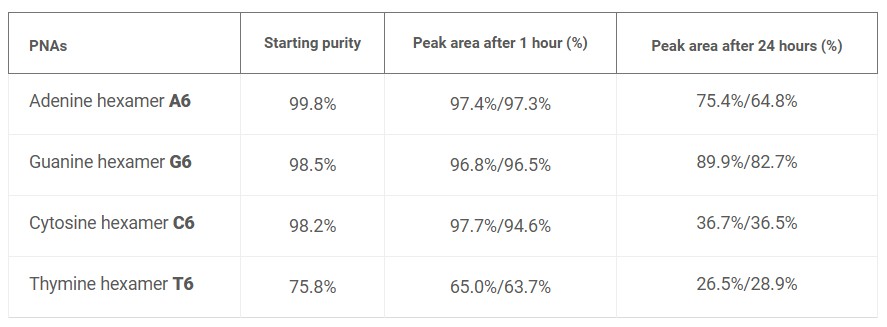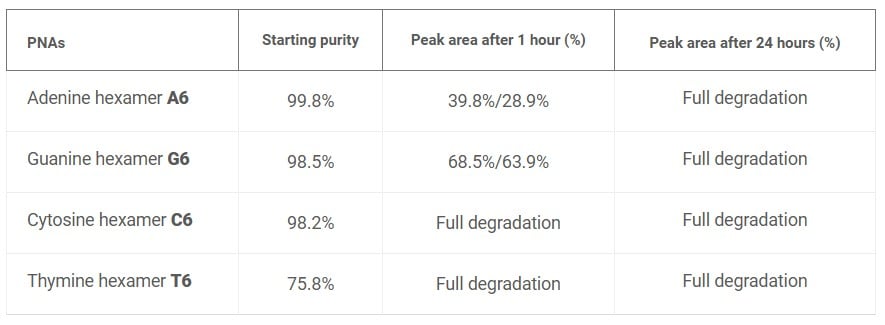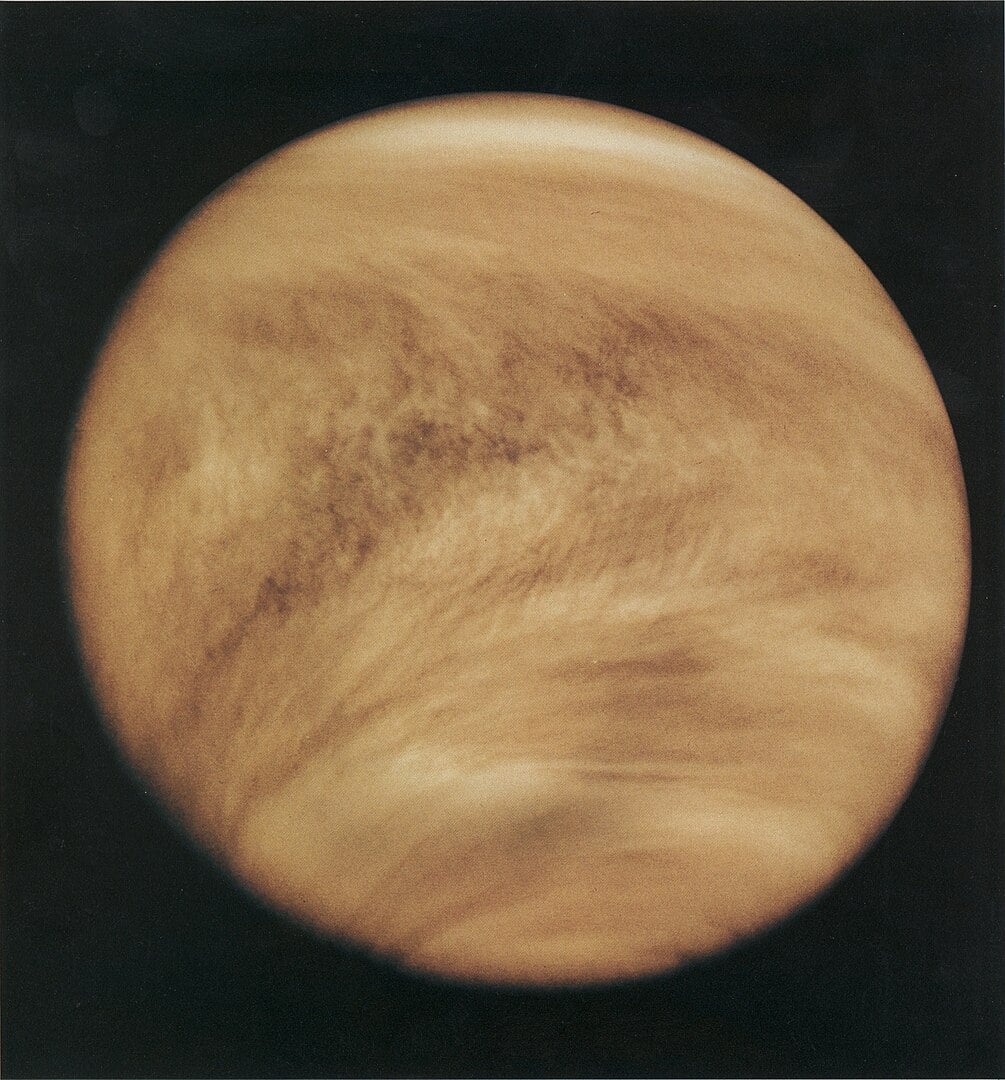Could some type of life find refuge in Venus' clouds? The detection of phosphine and potentially ammonia in the planet's atmosphere is posing that question. If life could survive there, would it be like Earth life? Or would it have a different molecular basis?
The surface of Venus is one of the most hostile and unforgiving places in the Solar System. The intense heat and atmospheric pressure mean no organism could survive there. Scientists have wondered if life could survive in its upper atmosphere, where conditions are temperate and more forgiving. New research shows that a molecule similar to DNA could survive there.
Venus' atmosphere is almost entirely composed of carbon dioxide. It has only trace amounts of water vapour, and its clouds are almost entirely made of sulphuric acid. Sulphuric acid is destructive to most organic molecules, or so scientists thought. However, new lab experiments show that some can survive in concentrated sulphuric acid.
The new research is titled "Astrobiological implications of the stability and reactivity of peptide nucleic acid (PNA) in concentrated sulfuric acid." It's published in Science Advances, and the lead author is Professor Janusz Petkowski from the Wrocław (Breslau) University of Science and Technology.
"We are at the beginning of new developments in organic chemistry for Astrobiology. As a community, we should focus on researching organic chemistry in solvents other than water, which is essential for understanding the extent of the habitability of the Galaxy." - from Petkowski et al. 2025
"Recent renewed interest regarding the possibility of life in the Venusian clouds has led to new studies on organic chemistry in concentrated sulfuric acid," the authors write. They explain that life requires complex genetic polymers, and finding one in sulfuric acid is the first step. Polymers are large, specialized molecules that can store genetic information. They're made of repeating smaller units, kind of like a chain. On Earth, DNA and RNA fulfill this role.
"Therefore, finding suitable candidates for genetic polymers stable in concentrated sulfuric acid is a necessary first step to establish that biologically functional macromolecules can exist in this environment," the researchers explain.
Peptide Nucleic Acid(PNA) is an artificially synthesized cousin of DNA and RNA. It's often studied as a potential proto-genetic molecule. In fact, the PNA world hypothesis proposes that early life on Earth may have used PNA as its genetic material.
The research focuses on lab conditions that mimic Venus' sulphuric acid clouds and PNA's ability to survive in them. The researchers wanted to determine whether PNA can survive in 98% sulphuric acid for two weeks.
 Venus' surface looks every bit like Hell. However, its clouds have much milder conditions. Image Credit: ESA
Venus' surface looks every bit like Hell. However, its clouds have much milder conditions. Image Credit: ESA
"People think concentrated sulfuric acid destroys all organic molecules and therefore kills all life, but this is not true, Petkowski said in a press release. "While many biochemicals, like sugars, are unstable in such an environment, our research to date shows that other chemicals found in living organisms, such as nitrogenous bases, amino acids, and some dipeptides, don't break down."
"PNA hexamers undergo between 0.4 and 28.6% degradation in 98% (w/w) sulfuric acid at ~25°C, over the span of 14 days, depending on the sequence, but undergo complete solvolysis above 80°C," the researchers write. A hexamer is a molecule made up of six smaller subunits, in this case, six nucleic acid building blocks linked together.
 This figure shows how each hexamer fared in 98% sulphuric acid at 50 °c after 24 hours. Image Credit: Petkowski et al. 2025. Science Advances.
This figure shows how each hexamer fared in 98% sulphuric acid at 50 °c after 24 hours. Image Credit: Petkowski et al. 2025. Science Advances.
"By demonstrating the stability of a polymer in 98% (w/w) sulfuric acid that is structurally related to DNA and is known to interact specifically with nucleic acids, we have taken a substantial step forward in exploring the potential of concentrated sulfuric acid as a solvent that could support the complex chemistry needed for life and, hence, the potential habitability of the Venus cloud environment," the authors write in their paper.
This work follows the detection of phosphine and potentially ammonia in Venus' atmosphere. These are biomarkers, and their presence on Venus is driving curiosity about the planet's clouds and their potential habitability.
Both ammonia and phosphine are biomarkers, which means they can indicate the presence of life." said Dr. William Bains from Cardiff University's School of Physics and Astronomy. "But Venus' clouds are utterly hostile to life as we know it on Earth. So our latest study seeks to explore the potential of concentrated sulfuric acid as a solvent that could support the complex chemistry needed for life in these seemingly uninhabitable clouds.
 This figure shows how each hexamer fared in 98% sulphuric acid at 80 °c after 24 hours. The higher temperature causes rapid degradation. Image Credit: Petkowski et al. 2025. Science Advances.
This figure shows how each hexamer fared in 98% sulphuric acid at 80 °c after 24 hours. The higher temperature causes rapid degradation. Image Credit: Petkowski et al. 2025. Science Advances.
"To find that PNA, with its similarities to DNA, can remain in concentrated sulfuric acid for hours is quite astonishing. It's a new piece of a much larger puzzle in our understanding of how life, albeit very different to ours, is made and where in the universe it might exist," said Bains.
Our study shows that PNA is no longer stable in sulphuric acid at temperatures higher than 50°C," Petkowski said. "So, our future research will focus on creating a genetic polymer - a molecule that can play the role that DNA plays in life on Earth - that is stable in concentrated sulphuric acid over the temperature range of Venus' clouds, between 0°C and 100°C, and not just at room temperature.
The discoveries so far are therefore only the first step towards finding such a stable polymer.
The researchers say they intend to synthesize a genetic polymer that's stable in this aggressive sulphuric acid concentration, and that this research is the first step. They point out that while these results are illuminating, PNA's instability at temperatures above 50 Celsius means that it cannot be the genetic polymer on planets with concentrated sulphuric acid at temperatures of 50 °c+.
They also remind us that these results only mean PNA can survive. They don't tell us anything about their potential genetic function. While single strands of PNA can survive, they're unlikely to be able to undergo base pairing.
However, they also say that concentrated liquid sulphuric acid could "sustain a diverse range of organic chemistry that might be able to support a form of life different from Earth's." Conventional wisdom says that only simple organic chemistry can survive in sulfuric acid, but the authors challenge that notion.
We are at the beginning of new developments in organic chemistry for Astrobiology," the authors conclude. "As a community, we should focus on researching organic chemistry in solvents other than water, which is essential for understanding the extent of the habitability of the Galaxy.
Press Release:DNA-like molecule could survive conditions akin to clouds of Venus, study finds
 Universe Today
Universe Today
